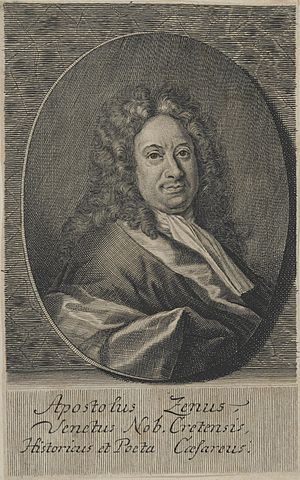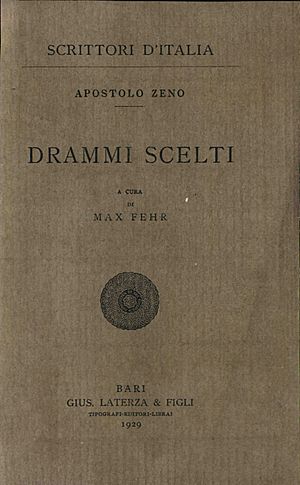Apostolo Zeno facts for kids
Quick facts for kids
Apostolo Zeno
|
|
|---|---|

Apostolo Zeno
|
|
| Born | December 11, 1668 |
| Died | 11 November 1750 (aged 81) |
| Nationality | Italian |
| Occupation | Poet, librettist, journalist, numismatist and man of letters |
| Known for | Reform of melodrama |
| Spouse(s) | Ludovica Mondonovo |
| Parent(s) | Pietro Zeno and Caterina Zeno (née Sevastò) |
| Academic background | |
| Education | Collegio di Castello |
| Influences | |
| Academic work | |
| Influenced |
|
Apostolo Zeno (born December 11, 1668, in Venice – died November 11, 1750, in Venice) was an important Italian writer. He was a poet, a librettist (someone who writes the words for operas), a journalist, and a numismatist (someone who studies coins). He is best known for helping to change and improve melodrama, which is a type of play with music.
Early Life and Career
Apostolo Zeno was born in Venice, which was then a powerful republic. His family, the Zenos, was very old and important in Venice. However, his family had lived in Crete for a long time. After the Ottoman Empire attacked Crete, his family returned to Venice. They were not allowed to be part of the highest noble class anymore.
Apostolo's father, Pietro Zeno, was a doctor. His mother, Caterina Sevasto, came from a well-known family in Crete. Apostolo lost his father when he was young. His mother then remarried. He was educated by the Somaschi Fathers, a religious order.
In 1691, Zeno helped start a group called the Accademia degli Animosi. This was a place where people interested in literature could meet. In 1695, he wrote his first libretto, called Gli inganni felici. It was very successful and made him a popular writer for operas. From 1705, he often worked with another writer, Pietro Pariati. Zeno focused on the main story for the stage, while Pariati wrote the libretti.
His Works and Influence
Apostolo Zeno also worked as a journalist. He helped with a publication called Galleria di Minerva. He wanted to make a big impact on it, but he felt he didn't succeed. He later called it an "idiocy."
In 1710, Zeno, along with Scipione Maffei and others, started a new magazine called Giornale de' letterati d'Italia. They believed Italians should create their own newspaper. They wanted to show that Italy had many smart and talented writers. This magazine was published every three months and became very successful. Many famous writers contributed to it.
In 1718, Apostolo Zeno was invited to work as a poet for the royal court in Vienna. He stayed there until 1729. After that, he returned to Venice. He spent his later years studying and collecting coins.
Zeno wrote the words for 36 operas. These operas often told stories from history or mythology. Some of his famous libretti include Gli inganni felici (1695), Griselda (1701), and Merope (1711). He also wrote 17 oratorios, which are like operas but without costumes or staging. These include Giuseppe (1722) and David umiliato (1731).
Changing Melodrama
Before Zeno, melodrama (early opera) often had unrealistic plots and too many exaggerated parts. People wanted more believable stories and better writing. Apostolo Zeno was the first to try and make melodrama more serious and realistic. He followed ideas from French tragedies, making sure his plays followed rules about time and place.
He made the stories simpler by reducing the number of characters and scenes. He also removed funny characters, or "clown roles," that were common in earlier melodramas. Zeno designed his works so they could be performed even without music.
Another famous Italian writer, Francesco de Sanctis, once said that Zeno was the "architect" of melodrama. He meant that Zeno created the basic structure and ideas. Later, Metastasio, another famous librettist, added the "grace and romance" to this structure, making it even more beautiful.
See also
 In Spanish: Apostolo Zeno para niños
In Spanish: Apostolo Zeno para niños
 | Charles R. Drew |
 | Benjamin Banneker |
 | Jane C. Wright |
 | Roger Arliner Young |


